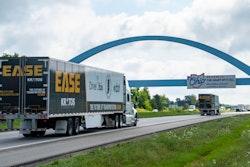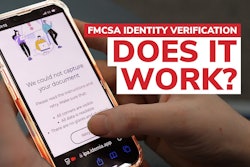Trade groups representing public and private CDL trainers across the nation wrote a letter to Department of Transportation Secretary Sean Duffy calling out the Federal Motor Carrier Safety Administration for not cracking down on bad actors or keeping up with the "threat" posed by "unscrupulous training entities."
The letter was penned by the Commercial Vehicle Training Association (CVTA), which represents mostly privately funded CDL schools, and the National Association of Publicly Funded Truck Driver Schools (NAPFTDS), representing places like community colleges. Together, the organizations speak for hundreds of schools and thousands of CDL trainers.
The groups wrote to "respectfully request" stronger enforcement of the Entry-Level Driver Training (ELDT) regulations, and a tighter grip on the Training Provider Registry, which FMCSA maintains.
NAPFTDS Executive Director Martin Garsee was part of the ELDT advisory committee in 2015 and runs a CDL school in Houston, Texas. "It would make sense to clean up the TPR," Garsee said. "There are a lot of people out there that still have one-day schools, where they teach you the CDL test and rent you a truck and teach you to drive it. That's nowhere near where the ELDT standards are."

The letter applauded FMCSA for "beginning the process of building the infrastructure for effective TPR oversight," yet its authors remained "deeply concerned that enforcement actions have not kept pace with the threat posed by non-compliant and unscrupulous training entities. These bad actors undermine the integrity of the driver training community, exploit prospective students, and jeopardize public safety by putting inadequately prepared drivers on the road."
The FMCSA falls behind, according to CVTA and NAPFTDS, by failing to remove such actors from the training registry in a timely fashion, or maybe at all.
As of April 11, letter authors said, a grand total of four training providers offering pre-skills-test training and listed on the registry had been removed since 2023. Additionally, only 25 schools have been issued Notices of Proposed Removals, authors added. That's despite "hundreds of complaints made by citizens and state agencies."
While mechanisms to boot bad schools racking up complaints are in place, removing four schools and issuing notices with no further action on 25 falls "far short of what is needed to meaningfully protect students and the motoring public," the letter said. "State agency partners that eagerly report illicit trainers to FMCSA are left wondering why those illicit actors remain on the TPR."
Said Garsee, "our frustration is that the rule is not being enforced."
CVTA Executive Director Andrew Poliakoff echoed Garsee's sentiments, saying that "we have seen some really solid progress in terms of implementing transparency and some improvements to enforcement in the TPR, but over the last year, in particular the last six months, we have seen no progress in the Notice of Proposed Removals turning into actual removals."
Schools that receive a Notice of Proposed Removal must inform their current and future students of their status, but Poliakoff said it was "just stunning" that schools could continue to operate for so long under that status.
"If there are individuals that decide they want to do 24-hour training, schools with no care or concern to adhering to the curriculum, that's what we’re most concerned about," he said.
As for what kind of "unscrupulous" behavior CVTA and NAPFTDS see, besides the one-day schools, Poliakoff said his organization has more than 100 school members with 400 locations in 46 states. "CVTA membership collectively trains about 100,000 entry-level drivers each year, so we have a really broad view all across the country of what's occurring," he said.
For the most part, CVTA members hear the horror stories secondhand -- students come in after going with a "bad actor" and describe being "fleeced out of money," Poliakoff said. State agencies tell him they submitted info to FMCSA about bad actors and they just aren't removed.
Garsee said that the Owner-Operator Independent Drivers Association had been helpful pushing for better training standards and enforcement. The American Trucking Associations, too, has been active on that front with its president, Chris Spear, penning a letter to Duffy a day before the training associations' joint letter to stress the need for better management of the TPR.
Spear wrote that the "Training Provider Registry is still insufficiently robust to shield prospective drivers and the motoring public from fraudulent and non-compliant training entities that fast-track CDL applicants with minimal, if any, training."
Spear's letter went on to say that “ATA believes that these providers serve as a venue for individuals to obtain a CDL simply by paying a fee, circumventing the structured curriculum established by ELDT."
Spear joined OOIDA in calling for the DOT "to begin better tracking the number of new CDLs issued on a state-by-state basis, including, but not limited to, the number of non-domiciled CDLs that are issued on an annual basis."
[Related: OOIDA urges Congress to act on non-domiciled CDLs, English proficiency]
As previously reported, no federal agency knows how many non-domiciled CDLs have been issued to non-citizens in recent years. That fact, along with lax enforcement of English Language Proficency, became a hot topic as advocates confronted FMCSA leadership at the Mid-America Trucking Show, calling for some accounting for what they saw as an unsafe, underpaid contingent of foreign drivers working the roads.
FMCSA responded to those advocates at MATS saying department leadership was having "serious conversations" about those topics, and they expected movement there soon.
[Related: FMCSA Chief Counsel on deregulating trucking, English proficiency and non-domiciled CDLs]
Garsee said that foreign nationals coming into the trucking industry without proper credentials "is a problem," and that he's in touch with the authorities about it. Garsee has heard "horror stories of the amount of foreign licenses that are just fraudulent."
He hoped the letters would spur the new administration's leadership at the DOT to take action and eliminate the "threat" of unsafe schools.










